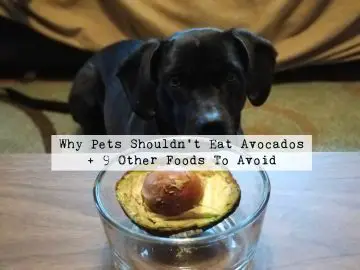As a veterinarian, it seems that everyone knows that cats and dogs shouldn’t eat chocolate, but what about other frequently consumed human foods. Check out the list below for information on human foods that our furry companions should avoid and why.
1. Avocados (Dogs and Cats)
Avocados contain a toxin called persin. Birds and ruminants (like cows) are very susceptible to this toxin and should never be fed avocadoes. While dogs and cats are far less sensitive, they can still develop vomiting and diarrhea when feed avocados. And absolutely never feed your dog the whole avocado with the pit/seed included. The large seed creates risk for a foreign body obstruction if swallowed whole.
2. Corn Cobs (Dogs)
While we are on the subject of foreign body obstructions, corn cobs are a big culprit of obstuctions in dogs. Never give your dog a corn cob to chew on. Corn kernels, however, are just fine.
3. Stems, leaves, and seeds of fruit like Apricots, Cherries, and Apples (Dogs and Cats)
The seeds, leaves, and stems of apricots and cherries contain cyanide (as does the core/seeds of an apple for that matter). Dogs and cats who eat apricots whole (not just the flesh) can develop cyanide toxicity and have difficulty breathing that can lead to shock and death.
4. Macademia Nuts (Mostly Dogs)
While more toxic to dogs than cats, macademia nuts can cause weakness, vomiting, tremors and an increased heart rate in both species. Symptoms typically occur within 3 to 12 hours of ingestion.
5. Bread Dough (Mostly Dogs)
While eating a large amount of bread dough can lead to problems in either species, dogs tend to be the ones gulping down large helpings of bread dough. Bread dough can expand in the stomach resulting in a bloated stomach. This can progress to a twisted stomach – which is called a gastric-dilatation volvulus (GDV). GDV is a life threatening disorder resulting in shock. Early symptoms include vomiting, non-productive retching, and a distended stomach.
A second concern with bread dough is that when the yeast is fermented, it results in the production of carbon dioxide and alcohol. The carbon dioxide release is part of the pathway that can lead to bloat. The alcohol can result in alcohol poisoning which can result in drops in blood sugar, blood pressure, and body temperature. So also, please never let your pets consume alcohol. .
6. Grapes, Raisins, and Currants (Dogs)
Many people are unaware that grapes are also toxic to your dog. The mechanism of action is not clearly understood, but ingestion of grapes, raisins, or currants can result in vomiting, diarrhea, and potentially (days later) kidney failure. The symptoms are not necessarily dose-dependent, as even small amounts can cause these symptoms in some dogs. There have even been anecdotal reports of cats and ferrets being affected, but this mostly just affects dogs.
7. Garlic and Onions (Dogs and Cats)
The Allium family, which includes onions, garlic, chives and leeks are poisonous to both dogs and cats at large enough doses. Garlic is considered about 5x as toxic as onions for both species, with cats being overall more sensitive than dogs. Interestingly, Japanese breeds of dogs, like Akitas and Shiba Inus are more sensitive than other dog breeds.
Garlic and onions both cause oxidative damage to red blood cells. This results in anemia. Symptoms of oxidative anemia include lethargy, pale gums, breathing faster, and weakness. Pets can also experience stomach upset, nausea, and diarrhea from consumption of either seasoning. The onset of these symptoms can sometimes take several days to develop.
8. Star Fruit (Dogs and Cats)
Star Fruit can contain calcium oxalates. If ingested in large quantities, this can result in poisoning in dogs and cats. the oxalate salts are absorbed from the stomach and intestinal tract. They then bind with the body’s calcium, resulting in a sudden drop in calcium. Rarely, acute renal failure can also be seen from ingestion of this fruit.
9. Xylitol (Dogs)
Xylitol is a sugar-free sweetener that is used in many chewing gums, snacks, toothpastes, etc. It has recently been seen in some peanut butters also. In dogs, ingestion of small amounts of xylitol can cause blood sugar levels to drop within 10-15 minutes. Ingesting larger amounts can result in liver damage. Symptoms include weakness, lethargy, collapse, tremors, seizures, vomiting, black stool, and in worst cases, death.
10. Chocolate (Mostly Dogs)
And finally, chocolate. Many of us know that chocolate is toxic to dogs, but here is why. Chocolate poisoning is due to the theobromine in the chocolate. This is a chemical similar to caffeine. When ingested, it causes vomiting, diarrhea, hyperactivity, increased thirst, abnormal heart beat, seizures, and sometimes even death. Dogs make up about 95% of chocolate causes, as cats typically do not choose to eat chocolate. Also note that the amount of theobromine in chocolate varies with type of chocolate. Generally, the darker the chocolate, the more toxic it is. A milk or white chocolate doesn’t cause too much concern in small amounts. But beware Baker’s chocolate, dark chocolate, and cocoa powder.
If your pet ingests any of the above foods:
Call your veterinarian. They can help you determine if your pet ate enough of the toxic substance to cause concern. I recommend having hydrogen peroxide on hand (as part of your pet first aid kit) in case your veterinarian wants you to induce vomiting at home. And remember, the best medicine is prevention. Keep the above foods out of your pets mouth and there will be nothing to worry about.
Interested in more information about human foods toxic to pets? Check out this article by the ASPCA. Or the information at Pet Poison Helpline.



One thought on “Why Pets Shouldn’t Eat Avocados + 9 Other Foods to Avoid”